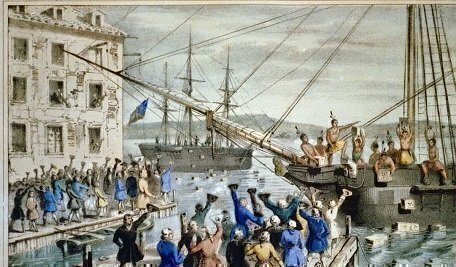[ad_1]
On December 16, 1773, a gaggle of Colonists destroyed a big British tea cargo in Boston harbor. So did this act of defiance mild a fireplace that led to American independence inside the subsequent decade?

For years, Individuals refused to purchase British tea as a result of it included a tax levied on tea drinkers, a thought that repulsed colonists who didn’t imagine they need to be taxed with no consultant sitting within the British parliament to voice their considerations.
As an alternative, Individuals purchased tea smuggled into the colonies. However in Could 1773, Parliament gave the East India Firm a tea monopoly in America that additionally made British tea less expensive than smuggled tea.
The animosity had been brewing among the many American colonists for months. On October 16, 1773, a gaggle of Philadelphia patriots determined to inform the British Crown that it could mount a boycott of tea, months earlier than an identical act in Boston.
The publication of a doc from the assembly referred to as Philadelphia Resolutions triggered public protests in Boston and Philadelphia. “The declare of parliament to tax America, is, in different phrases, a declare of proper to levy contributions on us at pleasure,” the Resolutions stated. “The responsibility, imposed by parliament upon tea landed in America, is a tax on the Individuals, or levying contributions on them, with out their consent.”
The Resolutions additionally made it clear that the group thought the cash raised by the tea tax by means of the Townshend Acts could be utilized by the Crown to get rid of native governments run by the colonies, and the group referred to as on Individuals to forestall “a violent assault upon the liberties of America” by stopping the unloading of tea shipments and any tea gross sales.
Three weeks later, an identical group met at Faneuil Corridor in Boston, and it adopted the Philadelphia Resolutions.
“That the sense of this city can’t be higher expressed than within the phrases of sure considered resolves, currently entered into by our worthy brethren, the residents of Philadelphia,” the Boston group stated.
Two months later in Boston, three ships arrived with 342 chests of tea. In what grew to become generally known as the Boston Tea Celebration, a celebration of males dressed as Native Individuals dumped the tea chest’s contents into Boston Harbor, after the governor, Thomas Hutchinson, refused colonists’ calls for for the ships to depart peacefully with their cargo unloaded.
In late December 1773, one ship with 698 instances of tea tried to land in Philadelphia but it surely was turned away. A bunch of 6,000 Philadelphians met on the State Home to debate the state of affairs, in what was the biggest mass gathering within the colonies. Tea shipments had been additionally blocked in New York and Charleston.
The violent protests in Boston Harbor had been met with a direct response from Nice Britain. In April 1774, the British Parliament handed the Coercive (or Insupportable) Acts, which punished Massachusetts for the Tea Celebration incident. The Acts not solely took away dwelling rule from Massachusetts, it pressured all Individuals to board British troops in unoccupied buildings.
On the similar time, Franklin wrote a public letter in London, below an assumed identify, that made it clear how he felt about Parliament, “who look like no higher acquainted with their Historical past or Structure than they’re with the Inhabitants of the Moon.”
“The Flame of Liberty in North America shall not be extinguished. Cruelty and Oppression and Revenge shall solely function Oil to extend the Fireplace,” Franklin added.
The opposite colonies noticed the Acts as a punishment focused in any respect of them, and by September 1774, the First Continental Congress met in Philadelphia to find out an applicable response. The next April, combating broke out at Lexington and Harmony, and the American Revolution was underway.
[ad_2]
Source link




